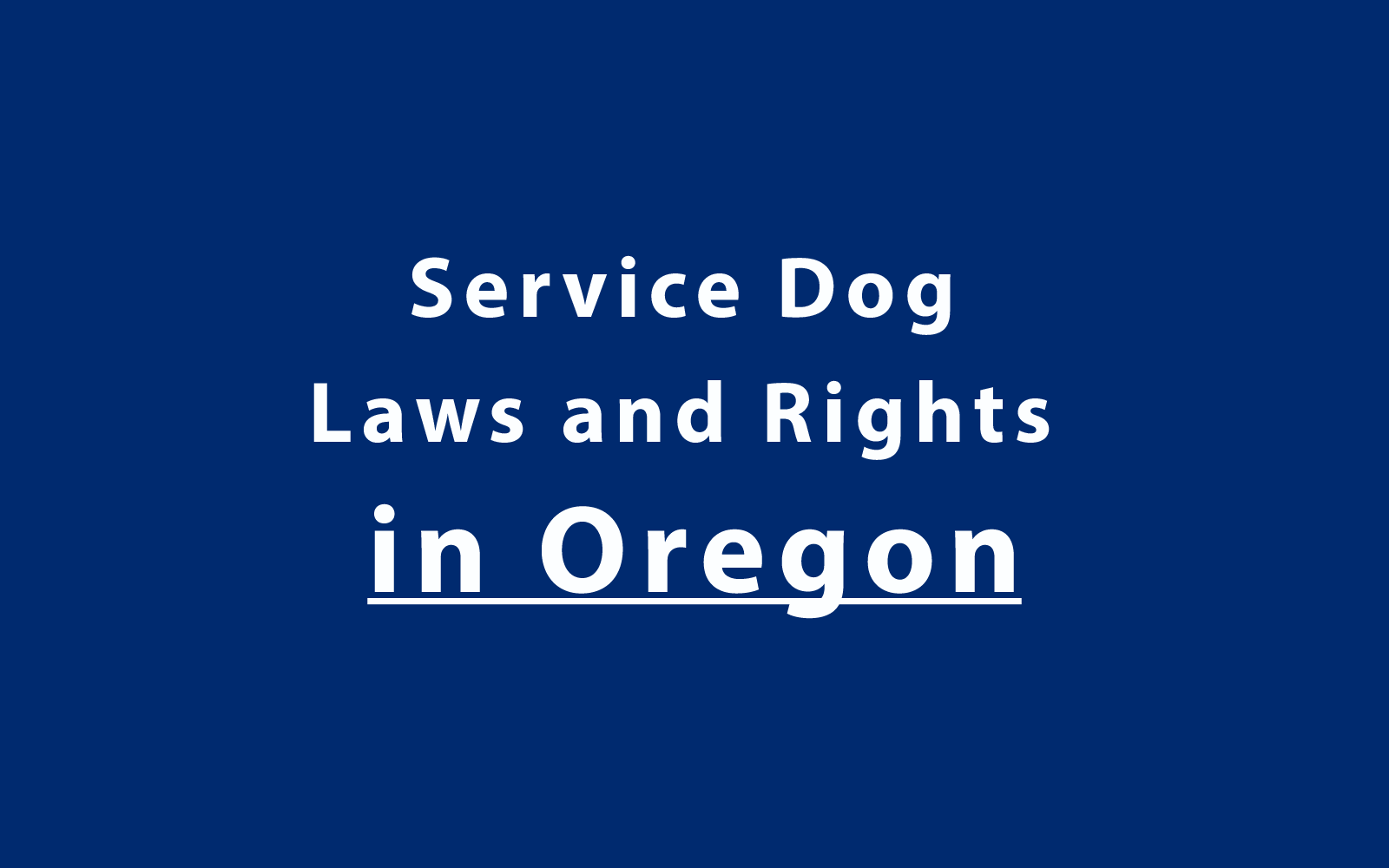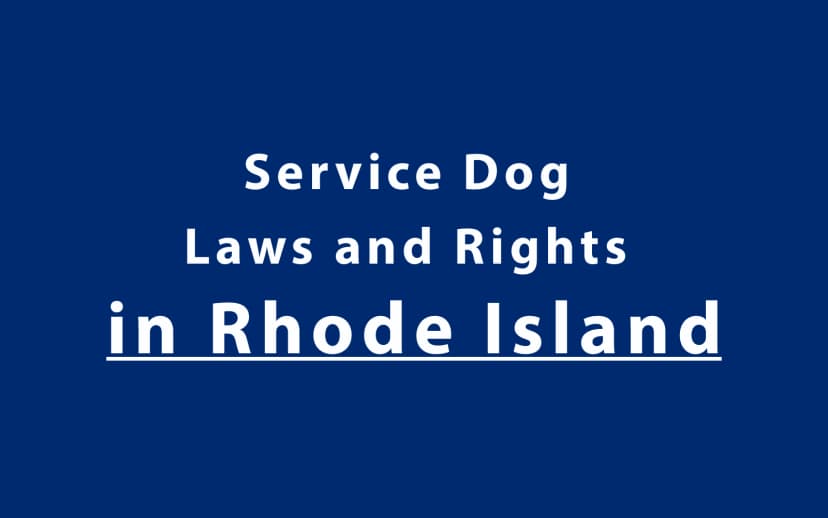Service Dog Laws and Rights in Oregon

Service dogs empower people with disabilities to live more independently by performing essential, disability-related tasks—from guiding individuals who are blind to providing psychiatric alert or mobility assistance. But with this valuable role comes a need for clear legal protections—and the state of Oregon offers exactly that.
In 2025, both federal and Oregon state laws protect the rights of service dog users in public spaces, housing, employment, education, and transportation. Whether you’re a handler, landlord, business owner, or public official, understanding these rights and responsibilities is critical.
This guide outlines everything you need to know about service dog laws and rights in Oregon.
Legal Definition of a Service Dog in Oregon
Under the Americans with Disabilities Act (ADA), a service dog is defined as a dog that is individually trained to perform tasks or do work for a person with a disability. These tasks must be directly related to the individual’s condition.
Oregon law mirrors this definition in ORS § 659A.143, which affirms that service animals are not pets but essential aids for people with disabilities.
Examples of tasks include:
- Guiding individuals with visual impairments
- Assisting with mobility and balance
- Alerting to seizures, panic attacks, or low blood sugar
- Retrieving objects, opening doors, or pushing buttons
- Interrupting self-harming behaviors
❗ Important Distinction: Emotional Support Animals (ESAs) and therapy animals do not qualify as service dogs under federal or Oregon law. They are not trained to perform specific tasks and are therefore not granted public access rights.
Public Access Rights in Oregon
Service dogs are permitted to accompany their handlers into virtually all public spaces, thanks to the ADA and Oregon Revised Statutes ORS §§ 659A.143–145.
Places where service dogs are legally allowed:
- Restaurants, cafes, and grocery stores
- Retail shops and malls
- Medical clinics, hospitals, and pharmacies
- Government buildings and post offices
- Hotels, motels, and lodging
- Public parks, libraries, and museums
- Public transportation (buses, light rail, and more)
What staff may ask (if disability is not obvious):
- Is the dog a service animal required because of a disability?
- What task is the dog trained to perform?
They may not:
- Ask for documentation or ID
- Require the dog to demonstrate its task
- Ask about the handler’s disability
Handler Responsibilities:
- Dog must be under control—leash, harness, or voice command
- Dog must be housebroken
- Handler is responsible for the dog’s behavior and any damage caused
Businesses may deny access only if:
- The dog is out of control
- The dog is not housebroken
- The dog poses a direct threat to others
Housing Protections in Oregon
Service dog users are protected under the Fair Housing Act (FHA), which applies to most rental properties in Oregon.
Housing providers must make reasonable accommodations for individuals with service dogs, even if their building has a “no pets” policy.
Key protections include:
- No pet fees, pet deposits, or breed/size restrictions
- Landlords cannot deny housing based on the presence of a service animal
- Accommodations apply to both rental homes and condos, including student housing
Landlords may request (if not obvious):
- Verification that the person has a disability
- Confirmation that the dog performs a task or service related to that disability
They cannot:
- Require certification or registration
- Demand medical records
- Delay the leasing process due to documentation
If your rights are violated, you may file a complaint with the U.S. Department of Housing and Urban Development (HUD) or the Oregon Bureau of Labor and Industries (BOLI).
Employment Rights and Service Dogs in the Workplace
The ADA Title I and ORS § 659A.112 protect employees with disabilities in Oregon from discrimination, including the right to have a service dog as a reasonable accommodation.
How to request a service dog accommodation:
- Inform your employer in writing
- Provide a doctor’s note or healthcare provider letter (only if the disability or dog’s role isn’t obvious)
- Participate in the employer’s interactive process to determine accommodation feasibility
Employers must accommodate unless doing so causes undue hardship, such as major disruption or safety concerns.
If your request is denied, you may file a complaint with:
- The Equal Employment Opportunity Commission (EEOC)
- The Oregon Bureau of Labor and Industries (BOLI)
Travel and Transportation Access
Air Travel – ACAA
The Air Carrier Access Act (ACAA) ensures that service dogs, including psychiatric service dogs (PSDs), can travel in-cabin with their handlers on U.S. flights.
To fly with your dog, you must:
- Submit the U.S. DOT Service Animal Transportation Form
- Ensure your dog is under control and non-disruptive
- Comply with individual airline procedures
Airlines may not:
- Charge fees for service dogs
- Restrict based on breed
- Require a vest or ID card
Ground Travel – Oregon Public Transit
Transit agencies across Oregon, including TriMet (Portland), Lane Transit District (Eugene), and Cherriots (Salem), follow ADA rules.
- Service dogs must be allowed on buses and light rail
- Taxis and rideshare services like Uber and Lyft must accept service dogs
- Denial of access is a civil rights violation
Access to Schools and Colleges in Oregon
K–12 Public Schools
Students with disabilities have the right to use service dogs under IDEA and Section 504 of the Rehabilitation Act.
- Oregon public schools must accommodate service dogs
- Schools may ask for:
- Confirmation of the student’s need
- Assurance that the dog is trained and under control
Colleges and Universities
Under the ADA, Oregon’s public and private institutions must allow service dogs in:
- Classrooms
- Dorms and campus housing
- Dining halls and recreational facilities
Students should coordinate with the Disability Services Office and may be asked to verify the dog’s purpose and that it meets health and behavior standards.
Service Dog Training and Registration in Oregon
There is no legal requirement for registering or certifying a service dog in Oregon. The ADA allows for owner-trained dogs, as long as the dog is task-trained and well-behaved.
Why consider voluntary registration:
- Can prevent conflicts in public spaces
- Helpful for landlords or airline staff
- Offers visual cues to avoid unnecessary questioning
At AssistanceDogPartners.org, we offer:
- Optional registration kits, including ID cards and vests
Service Dog Fraud and Misrepresentation in Oregon
Oregon law prohibits the misrepresentation of a pet as a service animal, and this is taken seriously under ORS § 659A.143(4) and ORS § 346.680.
Penalties may include:
- Misdemeanor charges
- Civil fines
- Community service or court-ordered education
What counts as fraud:
- Using a service dog vest or ID without a trained dog
- Claiming an ESA or therapy animal is a service dog
- Knowingly entering restricted areas with an untrained animal
Fraud makes it harder for legitimate handlers to be recognized and respected. Suspected fraud can be reported to law enforcement, public accommodation managers, or relevant state agencies.
State and Local Resources
Here are some trusted resources for Oregon service dog handlers:
- Oregon Bureau of Labor and Industries (BOLI) – https://www.oregon.gov/boli
- Disability Rights Oregon (DRO) – https://www.droregon.org
- Oregon Department of Human Services – Aging and People with Disabilities
- Local training centers in Portland, Eugene, Salem, and Bend
These organizations provide support for discrimination complaints, legal advice, and access to disability-related programs.
Frequently Asked Questions
Q: Do I need to register my service dog in Oregon?
A: No. Registration is optional. But voluntary registration can help avoid access disputes.
Q: Can a landlord deny my service dog in a no-pets apartment?
A: No. Service dogs are protected under the Fair Housing Act.
Q: Are psychiatric service dogs protected like guide dogs?
A: Yes. As long as they are trained to perform tasks related to a disability.
Q: What if a business refuses my dog entry?
A: Explain your rights calmly. If refused, file a complaint with BOLI or the U.S. Department of Justice.
Q: Can I train my own service dog in Oregon?
A: Yes. Self-training is permitted under both ADA and Oregon law.
Conclusion
Oregon offers strong legal protections for service dog handlers—ensuring you have access to the public, housing, education, and transportation without discrimination. With rights come responsibilities: your dog must be trained, under control, and task-oriented.
Whether you’re preparing your dog for public access or seeking documentation to prevent misunderstandings, you’re not alone.
At AssistanceDogPartners.org, we’re here to support you with trusted training, optional registration, and resources to help your service dog team succeed.



